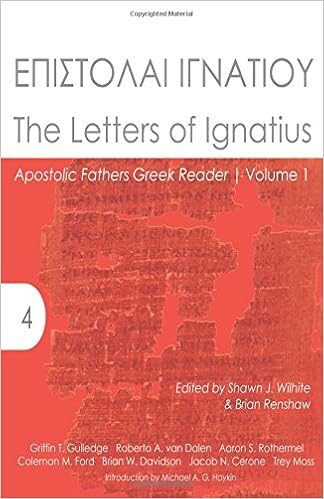 This morning in my reading I came across Mark’s pericope of the demon-possessed boy in Mark 4:14–29. If you are unfamiliar with the story, a father comes to Jesus requesting that he heal his son who has a spirit that makes him mute and causes seizures. The father had already brought the boy to Jesus’ disciples, but they were unable to cure him. Mark 9:19 records what happens next, ὁ δὲ ἀποκριθεὶς αὐτοῖς λέγει· Ὦ γενεὰ ἄπιστος (And answering he said to them, “O unbelieving generation!”).
This morning in my reading I came across Mark’s pericope of the demon-possessed boy in Mark 4:14–29. If you are unfamiliar with the story, a father comes to Jesus requesting that he heal his son who has a spirit that makes him mute and causes seizures. The father had already brought the boy to Jesus’ disciples, but they were unable to cure him. Mark 9:19 records what happens next, ὁ δὲ ἀποκριθεὶς αὐτοῖς λέγει· Ὦ γενεὰ ἄπιστος (And answering he said to them, “O unbelieving generation!”).
To whom is Jesus speaking and whose unbelief prompts this accusation? I always assumed he is speaking to his disciples who were unable to perform the miracle on account of their faithlessness. That is, after all, how Matthew presents the story in 17:20, ὁ δὲ λέγει αὐτοῖς· Διὰ τὴν ὀλιγοπιστίαν ὑμῶν (And he said to them, “Because of your little faith.“).
In Mark’s presentation of the story, however, other culprits may be guilty of the charge Jesus levels and the cause of accusation.
After Jesus’ transfiguration, he rejoins the other nine disciples who were engrossed in a debate (συζητοῦντας) with the scribes. Asking them what the debate is about, the father presents his case before Jesus, the disciples, and the whole crowd: Your disciples weren’t able to cure my son. Mark then writes ὁ δὲ ἀποκριθεὶς αὐτοῖς λέγει (and answering he said to them). To the disciples? To the whole crowd? To the scribes? Presumably the crowd and the scribes were debating with the disciples, claiming that Jesus did not have the power or authority to accomplish this task. Though not made explicit in the text, this would seem a reasonable conclusion on the basis of the surrounding thematic material.
As we continue reading through the narrative, we find another possible culprit: the father and the son. This reading is supported in Mark 9:22–24. After the father presents Jesus with the problem, he petitions Jesus to cure his son saying, ἀλλʼ εἴ τι δύνῃ, βοήθησον ἡμῖν σπλαγχνισθεὶς ἐφʼ ἡμᾶς (but if you are able to do anything, having compassion upon us, help us). Jesus’ response turns the father’s request on its head: Τὸ Εἰ δύνῃ, πάντα δυνατὰ τῷ πιστεύοντι (If you are able? All things are possible for those who believe).
Jesus’ response is either a rebuke of the father’s faithlessness in believing that his son can actually be healed—his son has had this affliction since childhood—or another rebuke of the disciples who should have been able to heal the boy if only they believed. If the latter, I would expect that Jesus would have said this with a bit of cheekiness. Perhaps with an inflection in his voice or maybe a sly glance over at the disciples. The former has support throughout the gospels where Jesus’ willingness to heal is consonant with the faith of those seeking healing (cf. Mark 2:4; 5:25–29; 6:5). Furthermore, the father, in his desperation, exclaims, Πιστεύω· βοήθει μου τῇ ἀπιστίᾳ (I believe. Help my unbelief), which seems to indicate that Jesus directed his statement at the father, not the disciples.
All three options—disciples, crowd, and father—have strong textual support. It would be easy for us to rely on Matthew’s version: Since Matthew frames Jesus’ rebuke as aimed against the disciples, it must mean that Mark has intended likewise. Mark’s ambiguity, however, allows for all three options, thus placing all three groups under the same rebuke—the disciples for their inability to heal, the father for his lack of faith, and the crowd for doubting Jesus’ power and authority.
[[Note: Though I made these observations prior to looking through the commentaries, you can look at France’s discussion on Mark 9:19 in his commentary in the New International Greek Testament Commentary series for a similar discussion and conclusion, p. 366.]]









Pingback: Biblical Studies Carnival - August 2014 - Biblical StudiesBiblical Studies
This helped me get clarification of the text. Thank you for this!